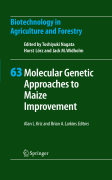
During the past decade, there has been tremendous progress in maize biotechnology. This volume provides an overview of our current knowledge of maize molecular genetics, how it is being used to improve the crop, and future possibilities for crop enhancement. Several chapters deal with genetically engineered traits that are currently, or soon will be, in commercial production. Technical approaches for introducing novel genes into the maize genome, the regenerationof plants from transformed cells, and the creation of transgenic lines for field production are covered. Further, the authors describe how molecular genetic techniques are being used to identify genes and characterize their function,and how these procedures are utilized to develop elite maize germplasm. Moreover, molecular biology and physiological studies of corn as a basis for the improvement of its nutritional and food-making properties are included. Finally,the growing use of corn as biomass for energy production is discussed. An in-depth review of maize biotechnology INDICE: Biotechnology and maize improvement - an overview.- Maize tissue culture, transformation and regeneration.- Insect resistance.- Reduced phytic acid.- Stress tolerance.- Nitrogen use efficiency.- Protein nutritional qualityand digestibility.- Over-expression of novel proteins.- Global regulations oftransgenic crops.- Doubled haploids.- Transposon tagging and reverse genetics.- EMS mutagenesis and TILLING.- Association mapping.- Genetic resources.- Structure.- Molecular markers.- Chromosome analysis.- Expression profiling.- Storage proteins.- Starch.- Lipids.- Chloroplasts.- Biomass and energy.
- ISBN: 978-3-540-68919-5
- Editorial: Springer
- Encuadernacion: Cartoné
- Páginas: 350
- Fecha Publicación: 01/09/2008
- Nº Volúmenes: 1
- Idioma: Inglés
